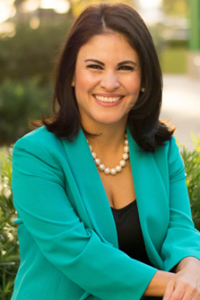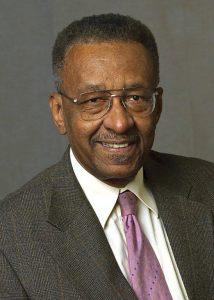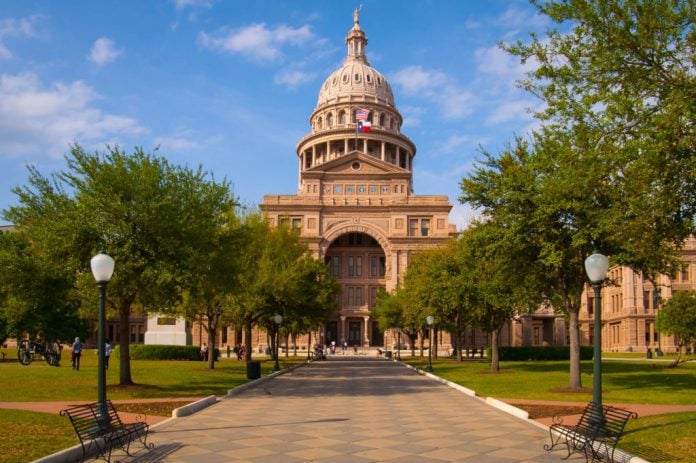
A recent Cambridge University study may shed some light on why we seem to be at a political and social, if not philosophical impasse regarding race in the United States. The study, titled The cognitive and perceptual correlates of ideological attitudes: a data-driven approach, found that our thinking may be severely hindered by extreme forms of ideologically based thinking.
As reported by The Guardian, “A key finding was that people with extremist attitudes tended to think about the world in black and white terms, and struggled with complex tasks that required intricate mental steps,” said lead author Dr. Leor Zmigrod at Cambridge’s department of psychology. Dr. Zmigrod elaborated, “Individuals or brains that struggle to process and plan complex action sequences may be more drawn to extreme ideologies, or authoritarian ideologies that simplify the world.” The Texas legislature may be engaging in this type of cognitive diminution with two new bills emerging simultaneously out of the Texas Senate and House of Representatives.

A Political Response to Charges of Racism
In their current forms, S.B. No. 2202 and H.B. 3979 seek to curtail the academic freedoms of Texas public school social studies teachers. Rep. Anna Maria Ramos (D-Dallas) of the Texas House of Representatives, also a college government studies professor, objects vehemently, stating, “All of those terms included in those included in this bill, it not only takes away our freedom of speech but our freedom of creativity to connect with those students to get them to own their own federal government and increase their participation in federal engagement,” she said. Ramos is likely referring to the following language of H.B. 3979:
(3) a school district, open-enrollment charter school, or teacher may not require, make part of a course, or award a grade or course credit, including extra credit, for a student’s: (A) political activism, lobbying, or efforts to persuade members of the legislative or executive branch at the federal, state, or local level to take specific actions by direct communication; or (B) participation in any internship, practicum, or similar activity involving social or public policy advocacy;
A Pushback Against Charges of Racism

Undaunted, the lead author of H.B. 3979, Rep. Steve Toth (R-The Woodlands), defended his handiwork by issuing the following statement: “This doesn’t do anything to ban. It doesn’t do anything to stop the free flow of discussion of current events or studies, any form or ethnic study.”
But the criticisms go deeper. “These bills try to ignore or downplay the racism, sexism and other injustices in our state’s and nation’s history, but students must be encouraged to fully explore and understand those injustices if Texas is to provide an equitable future for a rapidly diversifying population,” Clay Robison, a public affairs specialist for Texas State Teachers Association, stated recently to the Texas Tribune.
Robinson and others are uncomfortable with verbiage such as the following from S.B. No. 2202 which stipulate that teachers cannot “require or make part of a course the concept that”:
(i) one race or sex is inherently superior to another race or sex;
(ii) an individual, by virtue of the individual’s race or sex, is inherently racist, sexist, or oppressive, whether consciously or unconsciously;
(iii) an individual should be discriminated against or receive adverse treatment solely or partly because of
the individual’s race or sex;
(iv) members of one race or sex cannot and should not attempt to treat others without respect to race or sex;
(v) an individual’s moral character is necessarily determined by the individual’s race or sex;
(vi) an individual, by virtue of the individual’s race or sex, bears responsibility for actions committed in the past by other members of the same race or sex;
(vii) an individual should feel discomfort, guilt, anguish, or any other form of psychological distress on account of the individual’s race or sex;
Restrictions Around Discussions of Racism
Particularly disturbing to opponents of the bill is the following restrictions and parameters around the teaching of race in general, and slavery in particular, found in H.B. 3979, stating that teachers cannot teach the following:
(ix) the advent of slavery in the territory that is now the United States constituted the true founding of the United States; or
(x) with respect to their relationship to American values, slavery and racism are anything other than deviations from, betrayals of, or failures to live up to, the authentic founding principles of the United States, which include liberty and equality;
The bills take specific aim at The 1619 Project, a long-from journalistic series published by The New York Times Magazine, which according to the magazine’s website, “aims to reframe the country’s history by placing the consequences of slavery and the contributions of black Americans at the very center of our national narrative.” H.B. 3979 sates plainly:
(4) a teacher, administrator, or other employee of a state agency, school district, or open-enrollment charter school
may not: (C) require an understanding of The 1619 Project.
In a parallel fashion, Republicans have pushed back at the federal level. U.S. Senate Minority Leader, Mitch McConnell, had this to say to USA Today: “There are a lot of exotic notions about what are the most important points in American history. I simply disagree with the notion that The New York Times laid out there that the year 1619 was one of those years.”
Yikes, even if you disagree with the overall thrust of The 1619 Project, diminishing the beginning of slavery smacks of outright ignorance, if not carefully disguised bigotry, something not lost upon Dr. V. Faye Jones, Senior Associate Vice President for Diversity and Equity at the University of Louisville, who had this response: “To imply that slavery is not an important part of United States history not only fails to provide a true representation of the facts, but also denies the heritage, culture, resilience and survival of Black people in America.”
Of course, as the old saying goes, if you want to have a true impact on a situation, you should “hit them in the pocketbook. That’s precisely what S.B. 2202 does, stating:
(h-4) A state agency, school district, or open-enrollment charter school may not accept private funding for the purpose of developing a curriculum, purchasing or selecting curriculum materials, or providing teacher training or professional development for a course described by Subsection (h-3)(3).
Racism and Critical Race Theory
Now, as someone with libertarian leanings, these stipulations and restrictions rankle me. At best it seems hypocritical for so-called conservatives to advocate for ideas that restrict freedom; at worst, as a vociferous advocate for robust civil liberties, I find these measures repugnant. However, this political thrust did not happen in a vacuum. Rather, there is a social and political context that underlie the creation of these bills, and it cannot be ignored or dismissed.
To understand the impetus, and even the validity of these bills, one must grasp the import and impact that Critical Race Theory (CRT) has had upon public education, colleges, and a variety of social, civic, and governmental institutions, as well as private businesses.
Britannica.com traces the origins of CRT back to 1989 to the first annual Workshop on Critical Race Theory. However, CRS has intellectual roots going back even further. CRT’s immediate precursor was the critical legal studies (CLS) movement, which, according to Britannica, “dedicated itself to examining how the law and legal institutions serve the interests of the wealthy and powerful at the expense of the poor and marginalized.”
It is worth noting that CLS is an offshoot of Marxist-oriented critical theory. Dr. Linda S. Greene, the Evjue-Bascom Professor of Law at the University of Wisconsin-Madison, frames CRS this way in her publication From Tokenism to Emancipatory Politics: the Conferences and Meetings of Law Professors of Color: “The special contributions of scholars working on critical race theory arise from a unique blend of diverse scholarly traditions, i.e. civil rights; social political and discursive theory; feminist theory; post-modern literary criticism; Marxism and critical legal studies.”
In his article The Totalitarian Ideological Origins of Hate Speech Regulation, the author and political commentator John Bennet writes, “Marxism has substantial influence within critical theory, cultural studies, and critical race theory, which are prominent within the humanities, social sciences, and legal scholarship.” At the heart of both CRS and CRT is the philosophical dichotomization of society into oppressor and oppressed. Author and CRT expert Gloria Ladson-Billings writes in Just what is critical race theory and what’s it doing in a nice field like education? that “Critical race theory sees the official school curriculum as a culturally specific artifact designed to maintain a White supremacist master script.”
Marx himself presages this socio-political perspective in The Communist Manifesto: “Freeman and slave, patrician and plebeian, lord and serf, guildmaster and journeyman, in a word, oppressor and oppressed, stood in constant opposition to one another, carried on an uninterrupted, now hidden, now open fight, that each time ended, either in the revolutionary reconstitution of society at large, or in the common ruin of the contending classes.”
Yet, CRT is neither merely an intellectual framework nor a strictly academic pursuit. As Christopher F. Rufo, a senior fellow at the Manhattan Institute points out in a New York Post article, CRT “has increasingly become the default ideology in our public institutions over the past decade. It has been injected into government agencies, public school systems, teacher training programs and corporate human resources departments in the form of diversity training programs, human resources modules, public policy frameworks and school curricula.”

CRT and the Classroom
And it’s not a giant intellectual leap to make connections to the aforementioned cognitive study authored by Dr. Zmigrod. Rufo warns of the potential for CRT to promote radical thinking that circumvents traditional discourse and short-circuits well-founded dissension, pointing out the excesses of scholars such as Critical race guru Ibram X. Kendi, director of the Center for Antiracist Research at Boston University.
According to Rufo, Kendi “has proposed the creation of a federal Department of Antiracism. This department would be independent of (i.e., unaccountable to) the elected branches of government and would have the power to nullify, veto or abolish any law at any level of government and curtail the speech of political leaders and others deemed insufficiently ‘antiracist.’”
Rufo points out specific examples of this extremism in public schools to the New York Post:
- In Cupertino, Calif., an elementary school forced first-graders to deconstruct their racial and sexual identities and rank themselves according to their “power and privilege.”
- In Springfield, Mo., a middle school forced teachers to locate themselves on an “oppression matrix,” based on the idea that straight, white, English-speaking, Christian males are members of the oppressor class and must atone for their privilege and “covert white supremacy.”
- In Philadelphia, an elementary school forced fifth-graders to celebrate “Black communism” and simulate a Black Power rally to free 1960s radical Angela Davis from prison, where she had once been held on charges of murder.
Unfortunately, as a public educator and education consultant, I have witnessed these types of excesses firsthand. I have heard teachers guilt their white students for their “oppression” of minorities while being simultaneously told their opinions did not matter. I have borne witness to white students being intentionally excluded by teachers from dialogue about issues of race due to their skin color. The silence induced by this power-differential is not only hypocritical, but eerily ironic.
In his previously unpublished The Freedom of the Press article, George Orwell cautions us of this dynamic of cognitive and oratory inflexibility: “At any given moment there is an orthodoxy, a body of ideas which it is assumed all right-thinking people will accept without question. It is not exactly forbidden to state this or that or the other, but it is “not done”… Anyone who challenges the prevailing orthodoxy finds himself silenced with surprising effectiveness. A genuinely unfashionable opinion is almost never given a fair hearing, either in the popular press or in the highbrow periodicals.”
Perhaps ironically, CRS has caused a groundswell of grassroots conservative activism, as noted inThe Hill. “Particularly over the last year in lockdown, education has really rocketed to the forefront of definitely suburban mothers’ minds,” said Nicki Neily, president of the conservative group Parents Defending Education. “A lot of this new stuff was sprung on them with no heads up, no buy-in, no introducing it to the community,” she continued. “They feel like there’s sort of no input into the process.”
Texas Lt. Gov. Dan Patrick echoes Neily’s sentiments, averring, “Texans reject critical race theory and other so-called ‘woke’ philosophies that maintain that one race or sex is inherently superior to another race or sex or that any individual, by virtue of his or her race or sex, is inherently racist, sexist or oppressive…[T]hese divisive concepts have been inserted into curriculums around the state, but they have no place in Texas schools.”
But the cognitive inflexibility created by a strict adherence to CRT leads to not only poor decision making and suppression of alternative points of view, but ultimately serves as a form of self-reinforcing tautological orthodoxy that uses a combination of circular reasoning and negative labeling to simultaneously silence outside critics while artificially keeping its dogma internally coherent and irreproachable.

Source: dailysignal.com
Thomas Sowell, a black American economist, social theorist, researcher, senior fellow at Stanford University’s Hoover Institution and no stranger to the ethos of CRT explains the incoherency of CRT in this manner: “It’s one of many words that I don’t think even the people who use it have any clear idea what they’re saying. Their purpose is served by having other people cave in.”
What Sowell is getting at is a sort of sloppy solipsism that seems to undergird the tenets of CRT. Authors Helen Pluckrose, James A. Lindsay and Peter Boghossian of the recent study, Academic Grievance Studies and the Corruption of Scholarship say that “something has gone drastically wrong in academia, especially within certain fields within the humanities.”
They label these fields “grievance studies, where scholarship is not so much based upon finding truth but upon attending to social grievances. Grievance scholars bully students, administrators and other departments into adhering to their worldview. The worldview they promote is neither scientific nor rigorous. Grievance studies consist of disciplines such as sociology, anthropology, gender studies, queer, sexuality and critical race studies.”

Source: Cato.org
Walter Williams, (March 31, 1936 – December 2, 2020) another black conservative economist, author, and social commentator, offers a similar point of view, saying, “When social justice warriors use the terms ‘institutional racism’ or ‘systemic racism,’ I suspect it means that they cannot identify the actual person or entities engaged in the practice. However, most of what might be called institutional or systemic racism is practiced by the nation’s institutions of higher learning. And it is seen by many, particularly the intellectual elite, as a desirable form of determining who gets what.”

Perhaps nowhere is this more evident than in the ideology encapsulated in feminism, at least in its most current construct. As feminist, academic, and author Camille Paglia opines, feminism’s “ . . . portrayal of history as male oppression and female victimage is a gross distortion of the facts,” lambasting what she perceives as the “peevish, grudging rancor against men.”
Given these excesses, these extreme perspectives rooted in Marxist revolutionary language, it’s no wonder that Republicans are using political tools to combat what they perceive as a clear and present danger to the stability of American society and the preservation of our freedoms as expressed by the Constitution and its attendant Bill of Rights.
As Ian Rowe, a Resident Fellow at the American Enterprise Institute and a Senior Visiting Fellow at the Woodson Center argues, “ . . .let’s not adopt “anti-racist” agendas that actually plant the seeds of white superiority and black inferiority, instead of eliminating them. The antidote to racism is not anti-racism. It is a philosophy of humanism that celebrates and uplifts the inherent dignity in each individual. And the antidote to inequity is not diminished expectations for all. It is equal opportunity, and a belief in each person’s capacity for upward mobility, no matter their race, ethnicity or skin color.”
The Bottom Line
The problem is however, in seeking to redress the exigencies created by the more extreme elements of the progressive movement by passing legislation that limits freedom of speech and seeks punitive measures as a means to create change, Texas Congressional Republicans are in essence undermining their legitimacy and invalidating the essence of their argument, thereby giving potent ammunition to their detractors. When we fight fire with fire, everyone gets burned in an all-consuming conflagration that not only burns bridges but incinerates reason and moderation.
And that’s where we are in contemporary America: stuck in a no-holds-barred contest of extremist dogma that drowns out centrists perspectives on racism and holds rational compromise hostage. This tit-for-tat system of personalized polemics is the road to perdition for the United States, a ruinous path that leads to a literal cognitive and moral decline, as Dr. Zmigrod and his colleagues so assiduously captured in their study.
The bottom line is that extremist thinking is literally shrinking our brains and warping our collective consciousness. For the sake of our children, we have got to learn to listen to one another, to work with one another, and to find middle ground in our solutions and policies, especially regarding racism. There is no other option, and we are running out of time to solve this political impasse.




